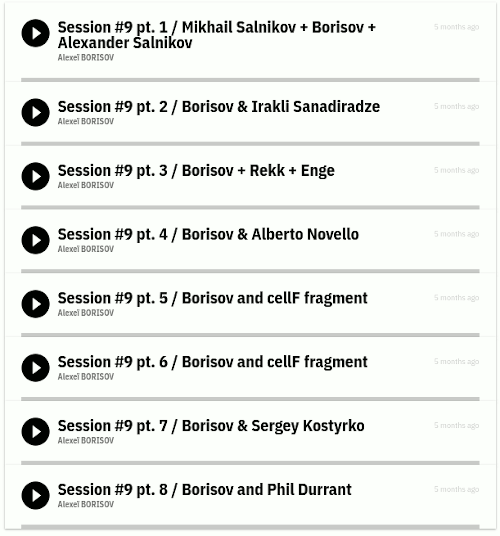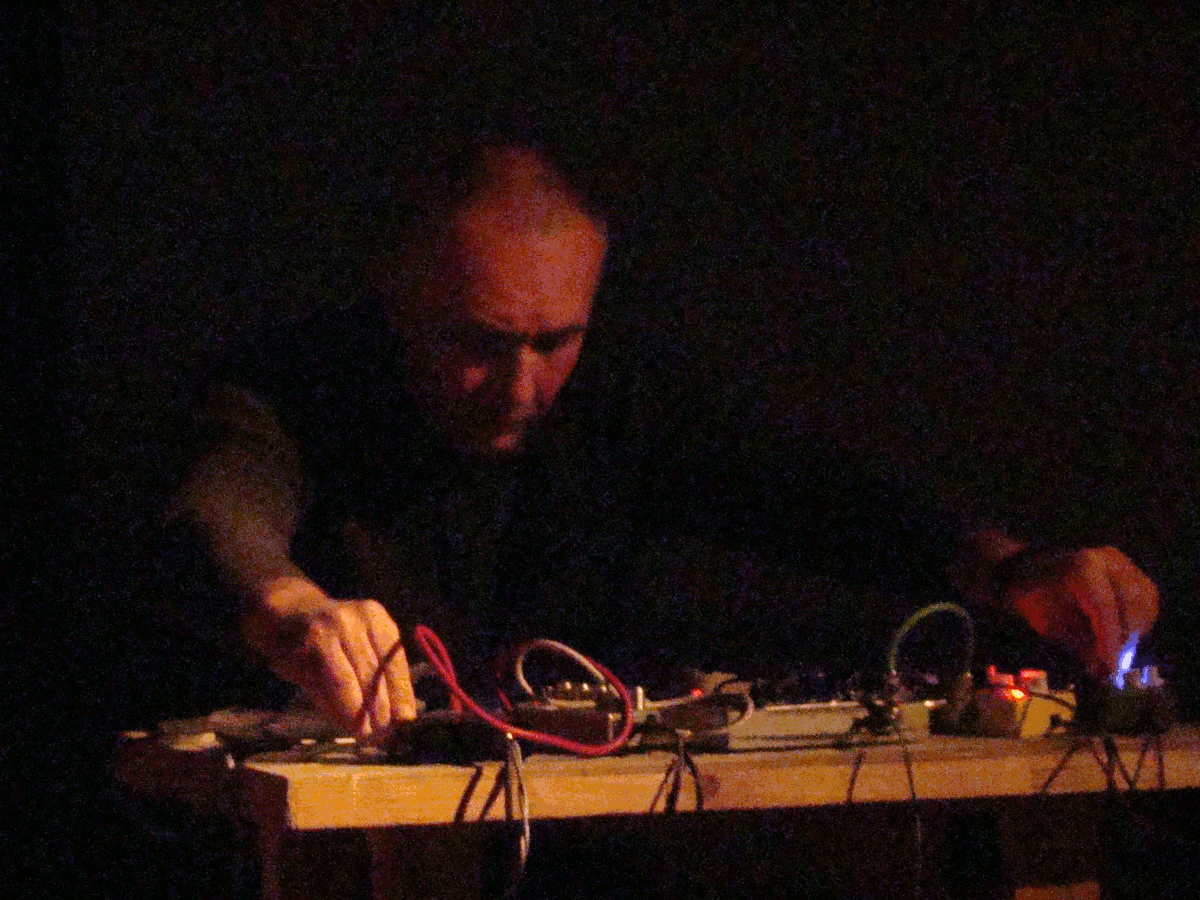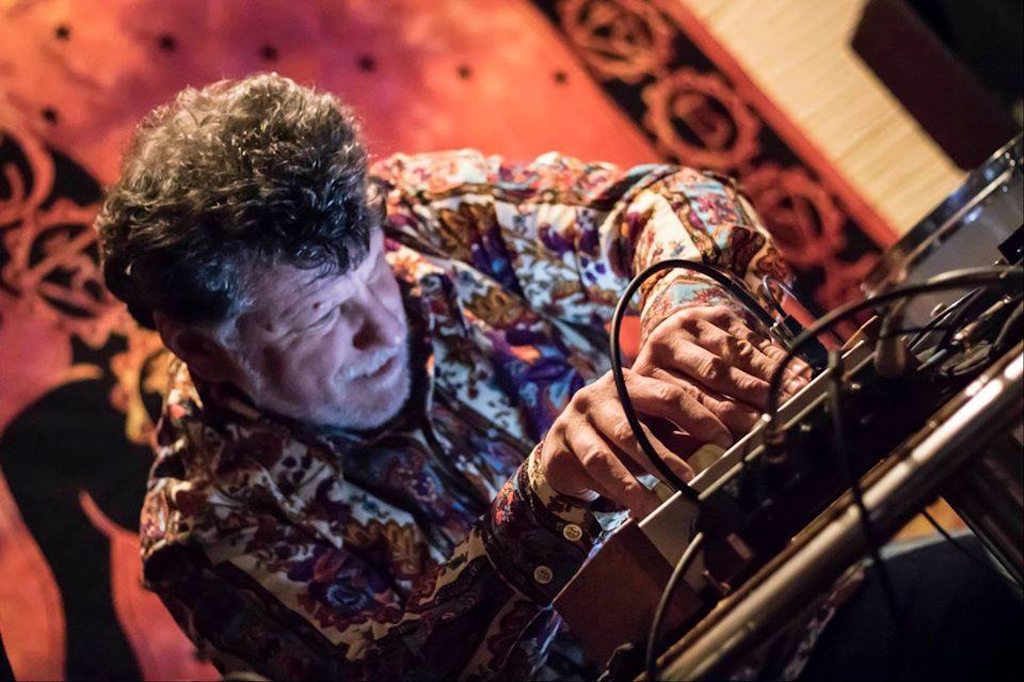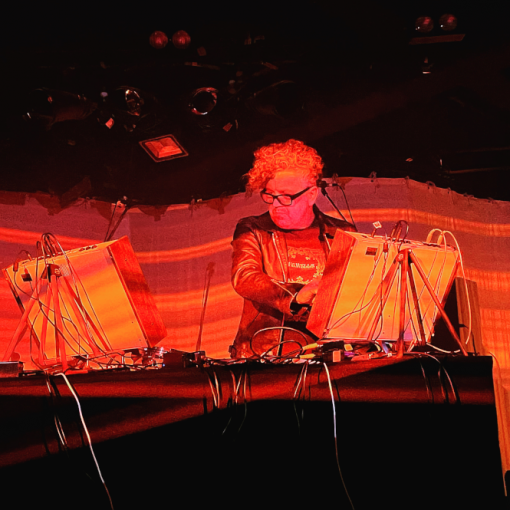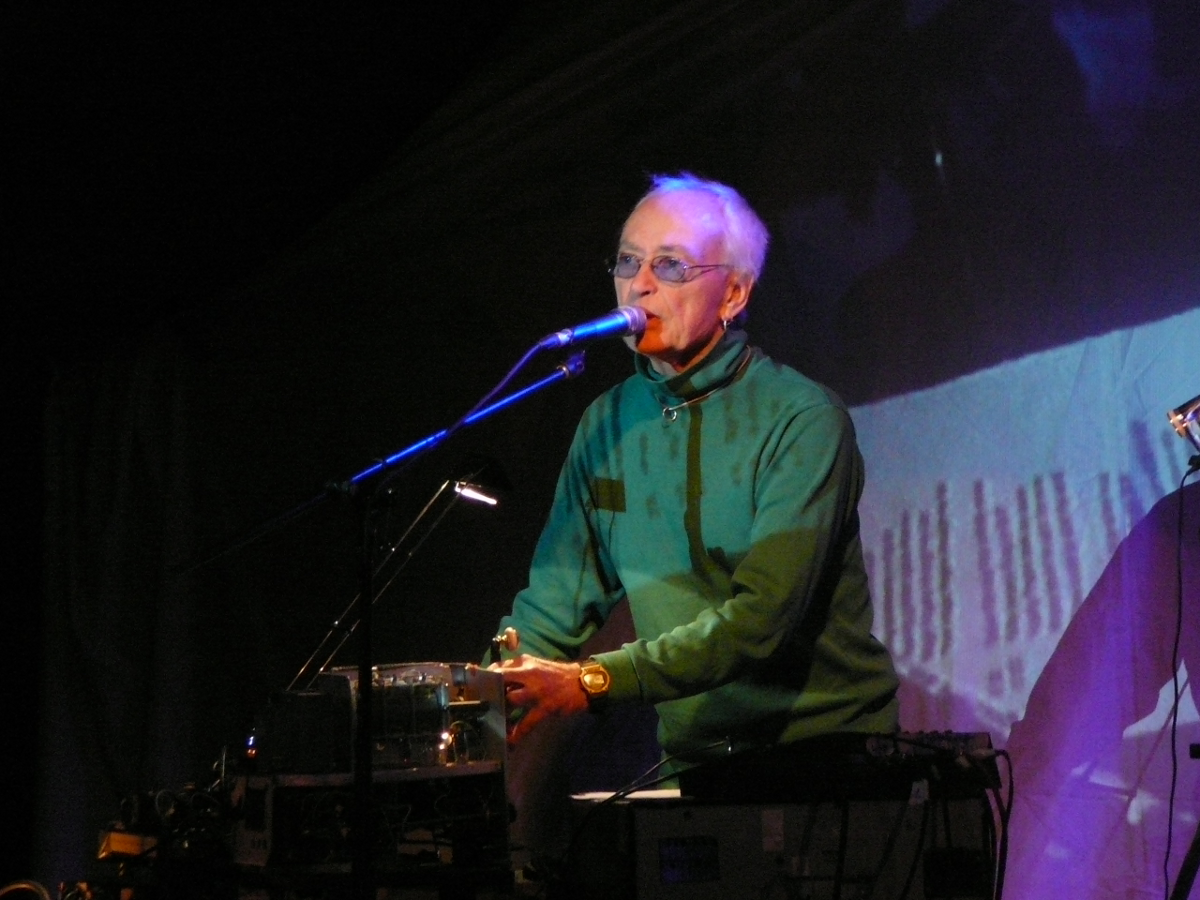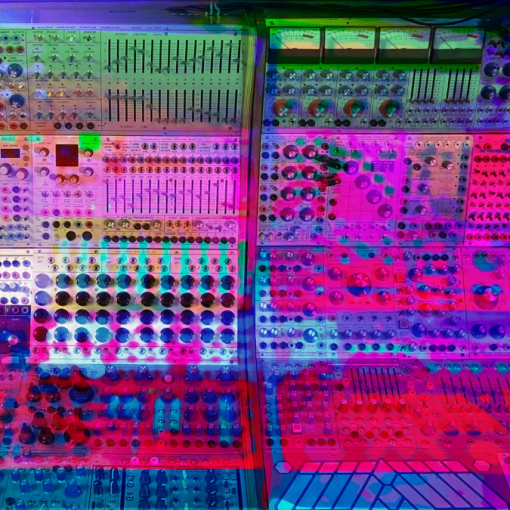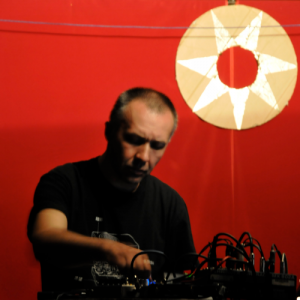 Founder of the N&B Research Digest label and member of Night Prospekt, F.R.U.I.T.S., Volga, ASTMA and the Fake Cats Project among others, Alexei Borisov has been a key member of the Russian underground since the Soviet era. He is also the curator of the Noise And Fury festival of experimental music at the DOM Cultural Centre in Moscow.
Founder of the N&B Research Digest label and member of Night Prospekt, F.R.U.I.T.S., Volga, ASTMA and the Fake Cats Project among others, Alexei Borisov has been a key member of the Russian underground since the Soviet era. He is also the curator of the Noise And Fury festival of experimental music at the DOM Cultural Centre in Moscow.
With a long-term interest in electronic and experimental music, his contributions to Philippe Petit‘s Modulisme sessions involved collaborations with eight other musicians. Alexei offers an important perspective from an Eastern European musical scene far removed from the abundant and expensive cornucopia of modules and equipment available to its Western counterparts on an individual basis.
When did you first become aware of modular synthesis as a particular way of making music, whether as part of electronic music in general or more specifically as its own particular format, and what did you think of it at the time?
I was thinking about modular systems and electronic music in general since when I’d seen some pictures of big modulars and synthesizers in Western music magazines and on some record sleeves in the ’70-’80s. Klaus Schulze, Tangerine Dream, Pink Floyd, Kraftwerk, the British electronic scene of late ’70s – early ’80s, etc. It was very inspiring, but looked too fantastic for our Soviet reality. Only in the mid ’80s did the idea of making electronic music became more or less real and practically possible for me.What was your first module or system?
My first experience in modular synthesis was Korg MS-20 in the 1980s. This powerful semi-modular device I used not only as a synthesizer, but as well as an effect processor for my guitar.
How long did it take for you to become accustomed to patching your own synthesizer together out of its component parts?
I’ve never had an opportunity to compile my own modular system. I’ve used MS-20 in the ’80s and much time later Czech micro-modulars by Bastl Instruments, the Kastl micro-modular.
Do you prefer single-maker systems (for example, Buchla, Make Noise, Erica Synths, Roland, etc) or making your own modular synthesizer out of individual components form whatever manufacturer that match your needs.
I think it’s good to have both versions in your studio… All these brands could produce interesting devices.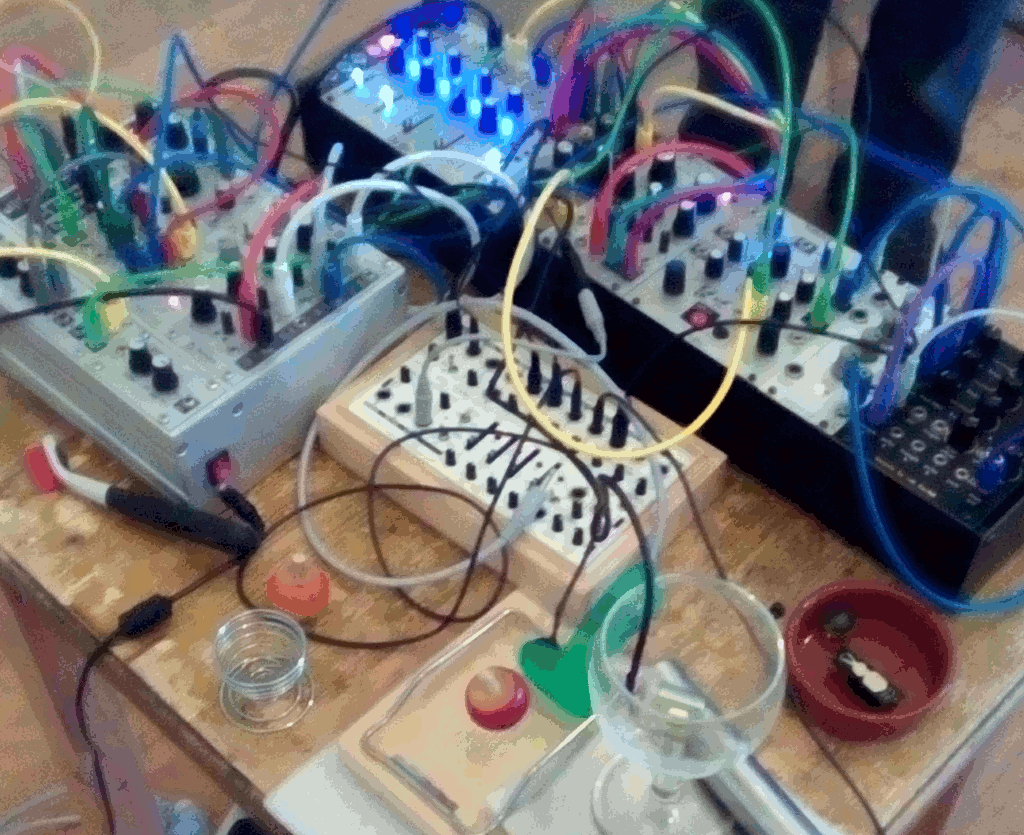
East Coast, West Coast or No-Coast (as Make Noise put it)? Or is it all irrelevant to how you approach synthesis?
Now it’s possible to order components and instruments from very different countries, and also some local engineers in Russia or Belorussia started to produce modular components or compile modular systems for any user as well.Do you tend to use pure modular systems, or do you bring in outside effect and devices when playing or recording?
It’s always interesting to use outside effects, such as guitar pedals, for example. But, of course, it depends on individual approach.
Do you find that you record straight with no overdubbing, or do you end up multi-tracking and editing tracks in post-production?
For the last ten years I’ve worked a lot with live recordings, recorded in stereo format. Using live fragments I can do post-production, mix and edit the staff in different ways. But a multitrack studio or live process could be very effective as well, especially if you do any collaborations with other people.
Do you pre-patch your system when playing live, or do you tend to improvise on the spot?
I prefer to improvise, using my micro-modulars in combination with DIY sound sources, tapes, mics and guitar.
Which module could you not do without, or which module do you you use the most in every patch?
Not so big choice in my case.What do you think that can only be achieved by modular synthesis that other forms of electronic music cannot or makes harder to do?
I guess that the advantage of modulars is that you can do almost endless combination of different modules and patches. The synthesizer as an instrument is something like a closed system with less options to modify it.
Have you used various forms of software modular (eg Reaktor Blocks, Softube Modular, VCVRack) or digital hardware with modular software editors (eg Nord Modular, Axoloti, Organelle), and if so what do you think of them?
I use Audio Mulch, which is good software, to my mind. It looks a bit like a modular object on the screen. And the principle of work of AM is quite similar to modular approach of producing music.
What module or system you wish you had?
I’d like to try different systems, of course. Erica Synths look attractive and affordable financially.
Have you ever built a DIY module, or would you consider doing so?
I am not sure that I can do it by myself. Technically I am not so capable in this process.
Which modular artist has influenced you the most in your own music?
There are many of them. Usually my friends among modularists with whom I collaborate by myself give me an opportunity to touch or feel the effectiveness of different modular systems. Sergey Kostyrko, Stephan Tcherepnin, Thomas Ankersmit, Kurt Liedwart, Brinstaar and Phil Durrant to name a few.Can you hear the sound of individual modules when listening to music since you’ve been part of the modular world — how has it affected (or not) the way that you listen to music?
Sometimes it’s possible, when somebody is playing modular in real time. And of course, if you want to compile your own effective modular system you have to listen carefully to different modules separately, its combinations etc..
What have you been working on lately, and do you have any upcoming releases or performances?
Yes, I have some plans for 2020! We are planning to release a CD of joint recordings of the Astma duo (Alexei Borisov and Olga Nosova) with French musicians Quentin Rollet and Jerome Lorichon. It was made in Paris in 2014. Plus I am in the process of making joint tracks with Jeff Surak from Washington DC. Also I am thinking of a new solo album for 2020. Another interesting project should be participation in an audio art exhibition, curated by Francisco Lopes for the Reina Sofia National Museum of Contemporary Art in Madrid.Can you outline how you patched and performed your Modulisme session?
Different collaborative studio tracks and live sound fragments, recorded for the last five years, have been chosen by Philippe Petit and myself for the Modulisme session.
Who would your dream collaborator be for a Modulisme session or otherwise?
I would love to record something together with Philippe Petit, Anthony Patheras or Robin Fox ( we played live together some time ago, but never worked in the studio or did any special recordings to release an album or something like that).
*
- Alexei Borisov’s Bandcamp site,
- N&B Research Digest’s website.
- Modulisme.
